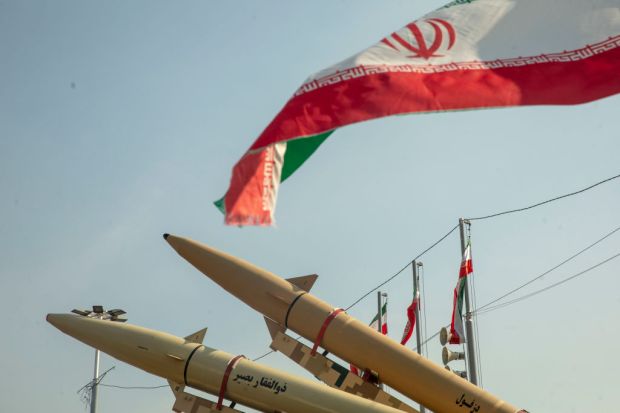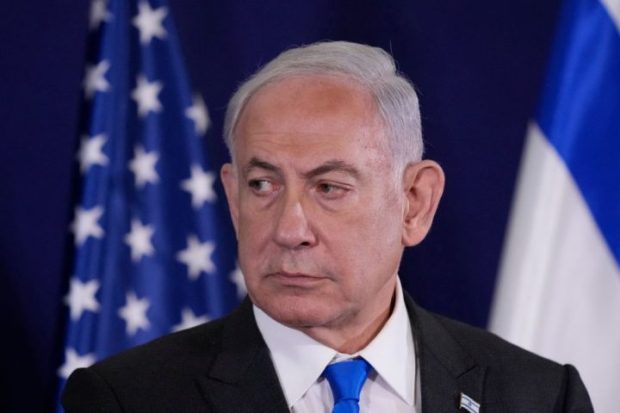‘You got a win. Take the win.’ This is reportedly what US President Joe Biden told Israeli Prime Minister Benjamin Netanyahu in a phone call following the thwarting of Iran’s Saturday night aerial barrage by Israel and a US-led coalition including Jordan and the United Kingdom. Tehran launched 170 drones, 120 ballistic missiles and 30 cruise missiles. While 99 per cent were intercepted, five missiles struck Nevatim Airbase in the Negev and a fragment from a projectile injured Amina Hassouna, a seven-year-old Bedouin girl, in Al Fura.
As analysts from the Institute for the Study of War point out, this ‘strike package’ is identical to those routinely deployed against Ukraine by Moscow. The combination of unmanned aerial vehicles and cruise missiles designed to ‘distract and overwhelm air defences in order to allow the ballistic missiles, which are much harder to shoot down, to reach their targets’. The Ukrainians manage to intercept just 46 per cent of ballistics.
The danger is that Iran learns that it is possible to target Israel without paying a price
In tactical terms, Saturday night was a ‘win’ for Israel and her allies. There is now a lot of optimistic talk about the Gaza rift between Washington and Jerusalem being over and some are even speaking of a ‘new Middle East’.
The Gaza rift is assuredly not over. The Biden administration remains disdainful of Netanyahu and critical of Israel’s handling of its military operation against Hamas, especially the humanitarian fallout. Israel, for its part, knows it cannot defeat Hamas without taking Rafah, but taking Rafah would strain relations with the White House even further. As for a new Middle East, Iran’s actions will have confirmed to the Saudis and others that cooperation with Israel is essential for regional security, but they have already been operating on this basis for some time.
These pollyannaish readings of Saturday night omit some important details. Biden’s ‘take the win’ came in the context of urging Netanyahu not to respond militarily and warning that the US would not participate in any such operation. He was telling Netanyahu to be satisfied with the attack being fended off and count it as a victory. Dodging a bullet is a highly desirable outcome when being shot at but it is not a victory, not if you aren’t allowed to disarm the gunman. The motley little coalition that took to the air alongside Israel did not do so out of the goodness of its heart, but because it knew doing so would make it more difficult for Israel to respond meaningfully to Iran’s attack. Much like ‘take the win’, David Cameron’s TV studio sermon about the need ‘to think with head as well as heart, to be smart as well as tough’ is a form of diplomatic blackmail. You owe us, they are telling Israel.
The Americans and the British want to avert an Israeli retaliation because they fear it could destabilise the region. Yet much of the instability in the region can be traced back to Iran, including the current Israel-Gaza war which Tehran helped to foment by encouraging Hamas’s 7 October outrage. Some in the US State Department and British Foreign Office still cling to the hope that Iran might be cultivated as a nominal ally, a Shia Qatar of sorts. This is the delusion that held sway during the Obama years, as seen in the Iran deal, and is back again under Biden. In a little over half a century, Washington’s policy on Iran has gone from realism to neoconservatism to rejected West Wing plotline.
As it happens, Netanyahu’s cabinet is divided on a military response, or at least the timing of one. That is understandable given the ongoing war in Gaza against Iran’s proxy Hamas and the threat to Israel’s north from Iran’s other proxy Hezbollah. But those are strategic considerations of the sort that every threatened nation needs to take into account. The danger is that in opting not to hit back, or not right away, Israel concedes a new precedent: the assistance of allies during an attack binds Israel’s hands against retaliation. The accompanying danger is that Iran, and other malign actors, learn that it is possible to target Israel without paying a price.
Israel is in no position to fight Hamas, Hezbollah and Iran all at once, but while that might suit the Biden administration it is not a ‘win’ for Israel. For Israel, as for any country threatened on multiple fronts, the only way to win is to win. Yet its allies don’t want it to hit Iran and they object to how it goes about hitting Hamas. Until they change their minds, or Jerusalem develops sufficient offensive and defensive capabilities to ignore their pleas, Israel will continue to be vulnerable to the Iranian threat.
Got something to add? Join the discussion and comment below.
Get 10 issues for just $10
Subscribe to The Spectator Australia today for the next 10 magazine issues, plus full online access, for just $10.




















Comments
Don't miss out
Join the conversation with other Spectator Australia readers. Subscribe to leave a comment.
SUBSCRIBEAlready a subscriber? Log in